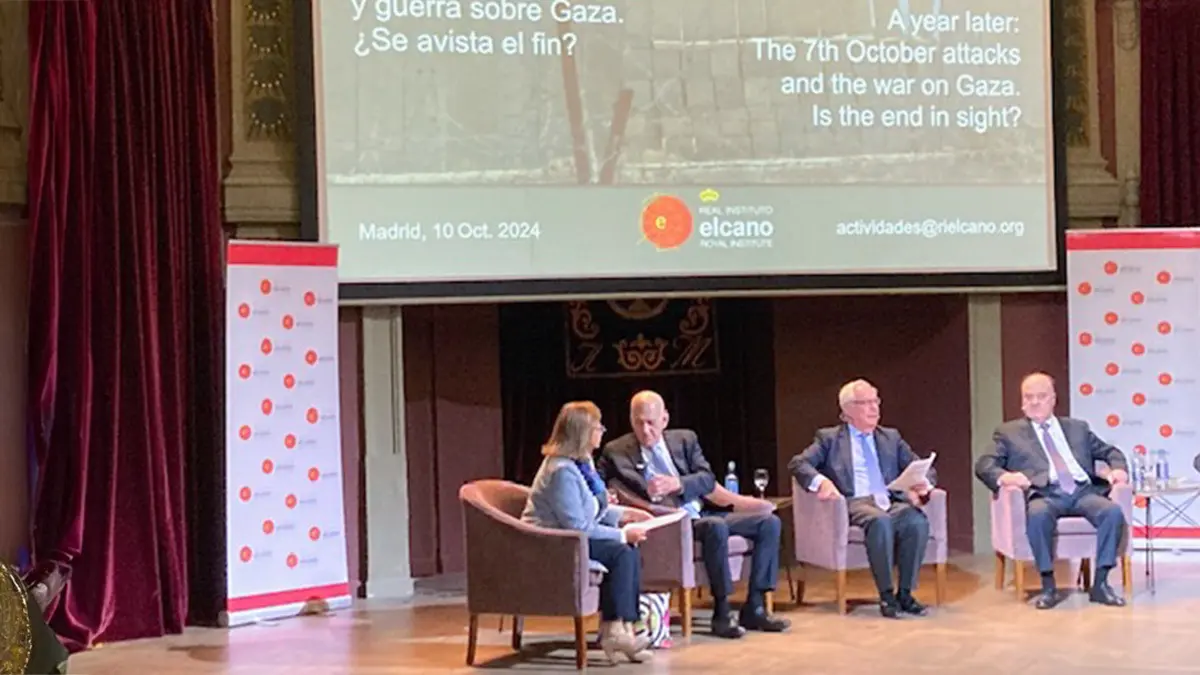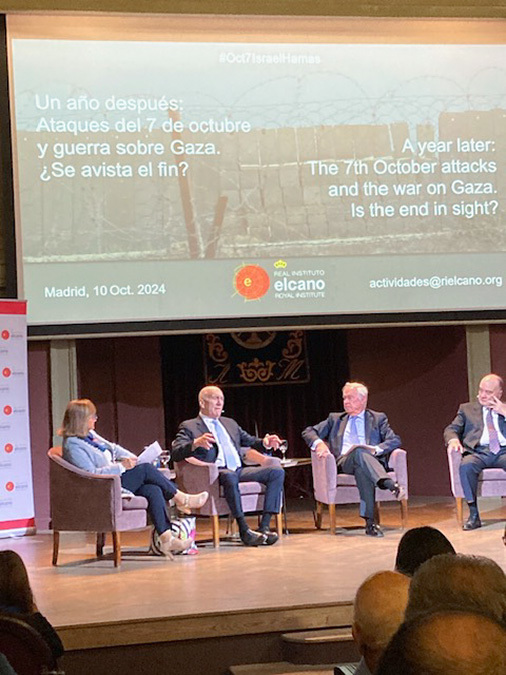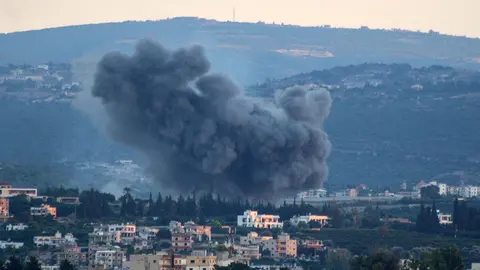No one listens to the tribal elders

Two entities at war, Israel and Palestine, although on the Jewish side they qualify that the war is against ‘a terrorist organisation, Hamas’; two old political rockers, one Jewish and the other Palestinian, and multiple attempts, so far unsuccessful, to put an end to the devastation of Gaza, the increasingly difficult coexistence in the West Bank, and the burning of the whole region.
‘The Middle East is on fire', said the Director of the Elcano Royal Institute, Charles Powell, opening what might appear to be an unusual dialogue on the stage of the Ateneo de Madrid. To his left and right, former Israeli Prime Minister Ehud Olmert and former Palestinian Authority Foreign Minister Nasser Kidwa, respectively.
Civilised conversation, fluid dialogue and many points of agreement, the first and most important of which was the urgent need to stop the war immediately. Both acknowledged that they were veterans of politics, ‘ex-leaders, but with enough wisdom and experience to at least be listened to’. It was a serious lament, a recognition that, in today's times, the views of tribal elders are no longer sought.
It was also the same view of the current leaders. ‘We will not move forward at all as long as Benjamin Netanyahu remains in power’. They base this on their belief that there was no need to prolong the war, and that the continuation of the war and its many dead and wounded ‘has not contributed to bringing back the hostages [held by Hamas]’. ‘Shedding more blood gets us nowhere’, they say, calling for a change of leadership in favour of leaders who are truly committed to peace.
Asked about the plan they would like to submit to EU heads of government, they say that, once hostilities have ceased, a ‘Council of Commissioners’ should be created, made up of technocrats and not politicians tied to parties and their corresponding inflexible servitude. It would be charged with governing the Gaza Strip. In addition to administering the most urgent needs, such a Council should organise democratic elections within a period of no more than three years. Implicit in this project is that the Palestinian Authority must be renewed, so as to create a government that can take charge of both Gaza and the West Bank.

In addition to advocating a return to the pre-Six Day War (1967) borders, which is also currently advocated by the United Nations, Olmert and Kidwa propose a ‘five-state trusteeship’ for the administration of the Old City of Jerusalem. Both Israel and Palestine would be part of such a body. With the map of the city in hand, both recognise Jerusalem as Israel's capital, encompassing under its jurisdiction all districts that already belonged to Israel before 5 June 1967, but adding Jewish neighbourhoods built after that date. In return, Arab neighbourhoods that were not under Israeli municipal authority before the same date in 1967 would become part of Jerusalem, also recognised as the capital of the State of Palestine.
The Olmert-Kidwa draft agreement does not ignore the issue of Jewish settlements in the West Bank, which Israel refers to by the biblical names of Judea and Samaria. According to the text signed by the two politicians, the state of Israel would annex 4.4 percent of the current West Bank territory, in an area where most of the new settlements are already located. But in return, the state of Palestine would have to annex an identical portion of land belonging to Israel.
Although it is the former head of Palestinian diplomacy who makes this point most forcefully, the former head of the Israeli government from 2006 to 2009 agrees, both accepting that this design is key to the formation and acceptance of the two states. The solution to the situation in Jerusalem is key for both, because ‘neither Jews nor Palestinians would accept the monopoly of the other over the thrice-holy city’.
At this point, Olmert asks himself the big question: ‘What are we going to do with six million Palestinians once the war is over? Are we going to continue with the occupation of their territories, denying them their right to self-determination and their most basic rights?’ And he answers himself: ‘If that happens, Israel will become an intolerable country’.
Before concluding, both former leaders reiterate their demand that the EU convene them in plenary session to explain their plan to its top leaders. Outside the Athenaeum and inside this veteran temple of culture, the security measures are exceptional and fully visible. It cannot be said that the old men of the tribe have not spoken out, displaying all the wisdom that experience has taught them.
From what the daily chronicles show, it seems that their plans do not coincide at all with those of these two interlocutors, who do not hesitate to embrace each other at the end of their appearance.











